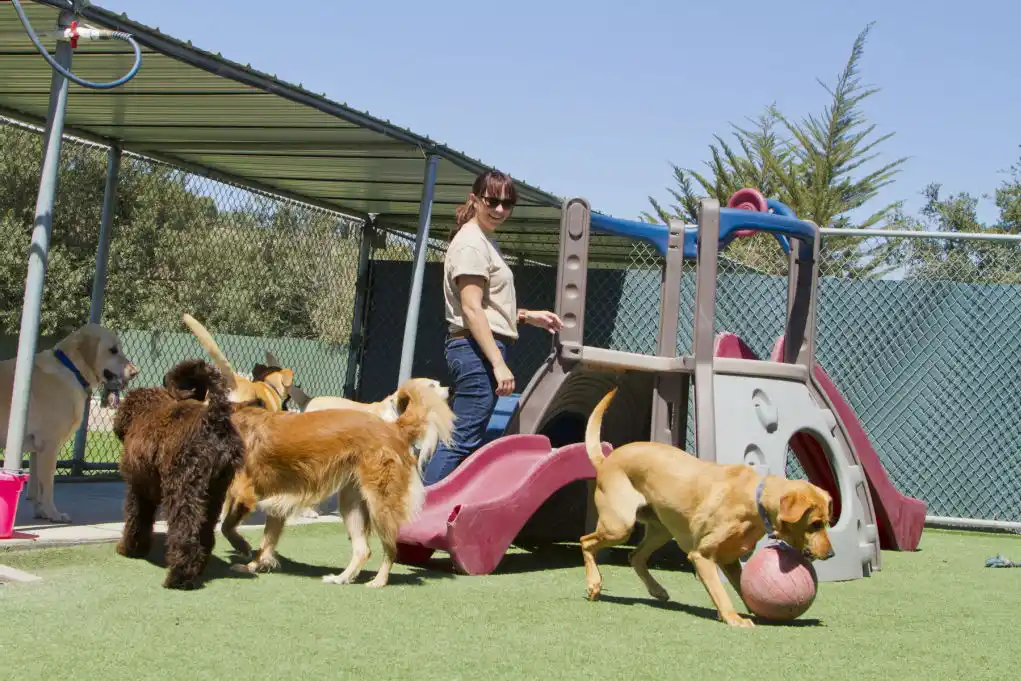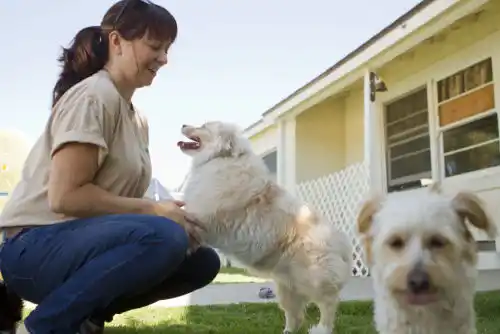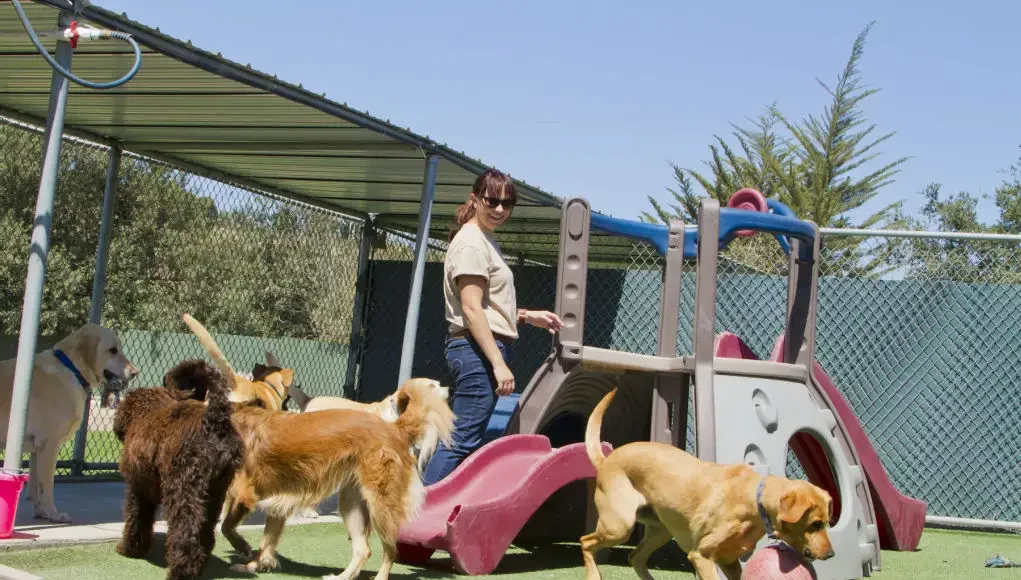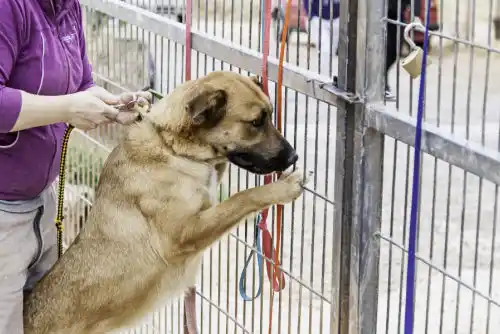Table of Contents
Vacations are always looked forward to, but what do you do when your dream vacation doesn't allow dogs?
As hard as it is to leave our dogs behind, there are lovely dog boarding options and alternatives to consider.
However, even after you find the best dog boarding location, you will need to prepare your dog for the experience.
Not all dogs are used to staying with other humans or pets.
Before finding a dog boarding company that works well for you and your dog, you should try to understand if it is a good choice.
Sadly, not all of our puppies remain calm in new situations, but there are a few things you can do to make their stay/dog board better.

What is Dog Boarding, and Is It Worth It?
Dog boarding is a practice where owners board their dogs in facilities that care for them for a long time.
All dog boarding locations look different.
Some facilities are high-tech, with lavish kennels and puppy spas.
The price ranges, but the average nightly rate in the U.S. is between $30 and $50.
But is it worth it?
Only you can make that decision. Not all dogs feel comfortable in dog boarding facilities.
They are frequently loud, filled with distractions, and, depending on who owns the facility, not always clean.
Regardless of your decision, you should always look through the reviews on different websites for the facility.
Sadly, not all employees and caretakers are experienced or good at their job, which can result in injury.
If it is your dog's first time in a boarding facility, you may need to prepare them for the experience.
If not, they could become stressed and react negatively to the anxiety.
How to Ease Your Dog's Anxiety About Boarding
So, you have decided to board your dog at a professional facility; what's next?
Separation anxiety is prevalent, especially in dogs that have not been socialized.
Approximately 20% of all dogs display separation anxiety-related behaviors, which can disrupt their lives.
The good thing is you can quickly calm them down with a few tricks.
When my dog suffers from anxiety, especially in a new situation, I always start by giving them a comforting space.
In your home, create a calming space with a dog bed, your dog's favorite toys, blankets, and food.
With time, your dog will associate feelings of relief and calmness with the spot and the items.
This way, when it is time to bring your dog to a boarding facility, you can rest easy knowing they have their items.
Most dog boarders are understanding and ready to help keep your dog as calm and happy as possible.
Another trick is to use essential oils.
Don't let your dog consume the oils as they can be toxic; instead, spray a few drops on their favorite items.
Lavender is a naturally calming scent.
Should I Bathe My Dog Before Dog Boarding?
First-time dog boarders have a lot of questions, and it is understandable as to why.
While not everyone bathes or grooms their dog before being sent to a dog boarding facility, professionals recommend a bath.
Brush your dog's coat before you bathe them to eliminate excess fluff.
However, if you don't have time, it is okay!
Most dog boarding facilities center around the philosophy of play.
In other words, your dog will get dirty while having fun, undoing all the work you put in.
Some dog boarding facilities have grooming services if you are leaving for longer than five days.
They'll give your dog a basic bath, which you can schedule in advance.

What Do I Do if My Dog Does Not Like Boarding?
The reality is not all dogs like boarding. Some dogs react negatively, which can disrupt your plans.
So, what do you do when you get the dreaded call to pick up your dog because they are being aggressive?
Most dog daycare and boarding instructors know how to handle even the most challenging situations, but safety is always first.
If, on rare occasions, your dog reacts negatively, feels sick, or acts aggressively, someone will need to pick up your dog.
This, however, does not happen often and can be prevented.
If you know your dog is not a fan of boarding facilities, we recommend changing your strategy.
Usually, when dogs react poorly to the facilities, it is because they are not socialized.
Instead of canceling all of your plans, it may be a good idea to think about boarding your puppy with a private dog boarding professional.
5 Ways to Prepare Your Dog For Boarding
Preparing your dog for boarding and other alternatives makes the process much smoother.
On top of that, if you're like me, you'll be relieved knowing your beloved pets will be okay.
Listed below are five ways to prepare your dog for boarding facilities.
Introduce Them To The Location
The first item on this list is introducing them to the location.
If your dog has never been to the boarding facility, I recommend talking directly with the owners.
If possible, schedule a tour with your dog. Take them twice, once on the leash and the next time off the leash.
One of the biggest causes of anxiety is fear and confusion in unfamiliar situations or locations. Taking away this reason can lead to a calmer stay.
It also helps to walk them around the location, not just inside.
For example, walk your dog around the facility at different times of the day.
Walking them during the morning, afternoon, and night can assist them in getting used to their new surroundings.
Prepare Your Dog's Favorite Items
Another thing you can do is prepare your dog's favorite items. We touched on this earlier, but it is crucial.
If you know your silly pup has favorite items they can't live without, make sure you bring them with you.
Pack one backpack with these items. This way, the employees can use the tools to help your dog transition during their stay.
This also goes for food, medications, and treats.
Most dog boarding facilities provide all the necessary items, but every dog has a preference.
This is super important, especially if your dog has a medical condition and needs a special diet.

Start Socializing at a Young Age
Thirdly, socialize your dog young. Not all of us buy or adopt dogs, though, as puppies.
But the sooner you introduce your dog to new situations, people, and pets, the better.
Socializing takes time, patience, and tricks up your sleeve.
Some dog breeds are easy to train and socialize, while others are hard-headed with difficult personalities.
Doggy playdates and frequent walks in busy areas can help your new dog get accustomed to new smells, loud noises, and busy streets.
After each positive encounter, provide your dog with a treat. This positive reward helps train your dog successfully.

Meet and Great with Employees
The fourth item on our list is closely tied to the first item on this list.
Not only should your dog get used to the location, but also the people in charge of taking care of them.
This is especially important if you are thinking of boarding your dog with a private, professional dog boarder.
Usually, in these situations, dog boarders use their home, which has plenty of space.
They sometimes have other pets or only take one dog at a time.
While it's a more expensive option, your dog gets personalized one-on-one attention.
Start with small steps when introducing your dog to the employees or other boarders.
Walk with your pet on a leash. Even if your dog is the friendliest and has never reacted aggressively, there is always a first time for everything.
To avoid this, keep them on a leash and close by.
Let your dog slowly get close to other boarders and smell them.
I recommend doing this multiple times before your vacation begins.
Take Your Dog for a Check-Up First
Last but not least, it is better to be safe than sorry.
Before going on a vacation and leaving your dog in the care of a professional, take them to a quick check-up vet visit.
During this visit, your vet can ensure your dog is safe, clean, and healthy.
They can check for fleas, allergic reactions, and other conditions, so it doesn't spread to the dogs sharing the space in the facility.
After your dog gets back, retake them. This way, you can compare.
Other dogs in close kennels sometimes have bugs or illnesses that spread quickly.
Conclusion
All in all, our beloved pets should enjoy a vacation, just like us.
However, it's not always possible to take them with us.
Dog boarding facilities are a great option when this is the same, but you should prepare your loving dog for the transition.














